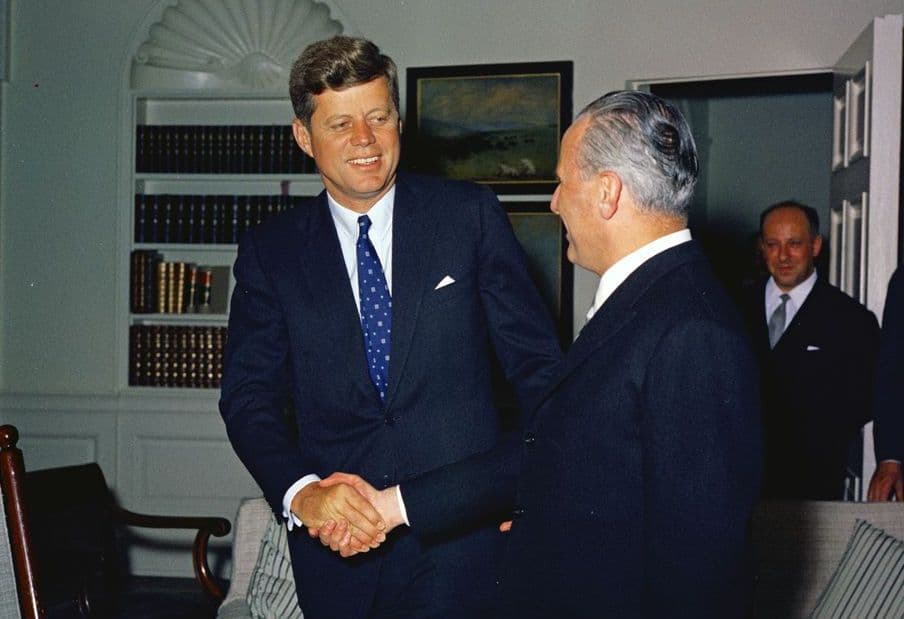JFK in a Family Way
Especially intriguing is the biographer’s handling of the Cuban Missile Crisis and the interplay between JFK and Robert, his brother and attorney general, and their father, Joseph Kennedy.

‘JFK: Public, Private, Secret’
By J. Randy Taraborelli
St. Martin’s Press, 592 Pages
Author of five books on the Kennedy family that concentrate, in the main, on Jacqueline Kennedy Onassis, J. Randy Taraborelli has drawn on three decades of work in archives full of oral histories by John F. Kennedy’s friends and family, and on interviews with them and others, to present a nuanced and thoughtful, if not exactly fresh, biography of the nation’s 35th president.
Mr. Taraborelli describes his biography in a very fetching fashion as “an exploration of the pivotal moments and touchstones that can make a person who he is—the impact of a son’s relentless desire to avoid remaking himself in his father’s image, for instance, or of a son who goes on to become a father himself and how that can change him in unexpected ways.” Readers can easily identify with such a man on his way, his biographer suggests, to becoming his own man in some surprising ways.
To readers of the many Kennedy biographies, much will be familiar; for example, in retelling the rumored affair with Marilyn Monroe. However, Mr. Taraborelli eschews breathless innuendoes, concluding that hard evidence of anything like an affair is not to be had, and much of what has been proffered as proof is suspect.
Mr Taraborelli is dogged and has gone back to his interviewees time and again, sharing with us his evolving sense of JFK as a man of many loves, to be sure, but not the foolish flake he sometimes appears to be in the more sensationalistic accounts. In fact, toward the end of JFK’s abruptly curtailed life, Mr. Taraborelli suggests his subject may have begun to regret his trysts and embarked on the repair of his marriage.
The “secret” in Mr. Taborelli’s subtitle is not actually a teaser, a ploy to entice readers with the notion that he has discovered what other biographers have failed to detect. On the contrary, he suggests that everyone has secrets not meant for anyone to know, and that remain so with JFK.
The biographer is mainly concerned with the “consequential decisions to be made against a background of family concerns.” Especially intriguing is his handling of the Cuban Missile Crisis and the interplay between JFK and Robert, his brother and attorney general, and their father, Joseph Kennedy.
Although military and foreign policy advisors favored a strike against Russian missiles in Cuba, Robert Kennedy advised caution, a blockade, and negotiation. Mr. Taraborelli argues that RFK, a changed man, had earned his brother’s respect: no longer was he “the scrappy and impulsive brawler he’d been in the 1950s while grilling mobsters on television.” Now a “more reasoned and logical thinker … more aware of the complexities of the world,” RFK aided his brother in withstanding the pressure for a military solution.
Another factor in the family dynamic also enters the scene: the father JFK had diverged from, the father who had sought to keep America out of World War II. Sometimes, JFK insisted, wars are necessary. Yet Joseph Kennedy remained an implicit influence on his son, Mr. Taraborelli contends.
The biographer dramatizes the father-son colloquy, with Joe “whispering in his son’s ear. No war. Find another way. Bobby, of course, agreed.” The very phrase Mr. Taraborelli employs, “the power of negotiation,” is a counterweight to the war cries.
What Mr. Taraborelli cannot prove and what he could not hear is the very whispering he conjures as a way of dramatizing the intimate, never to be revealed secret of what father and son may have shared, perhaps without ever acknowledging as much. Although Mr. Taraborelli’s case for Joseph Kennedy’s impact on his son’s resolution of the Cuban Missile Crisis cannot be proven, the very conceit of a father’s voice embedded in his son’s consciousness is one I have trouble resisting.
For historians, this book breaks no new ground — nor does it claim to do so — but to biographers who try to penetrate their subjects’ psyches, who have to muse upon family dynamics and what is unspoken and yet seems apparent in their subjects’ behavior, a biography that insists there is more to biography than the public and the private, and that at least some deference to what is still secret must be expressed, is to be commended.
Mr. Rollyson is the author of “Marilyn Monroe: A Life of the Actress,” and a forthcoming book, “Making the American Presidency: How Biographers Shape History.”

